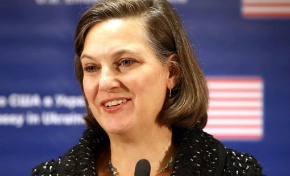In late February, a conference is scheduled in New York City to discuss the risk of nuclear war if computers reach the level of artificial intelligence and take decisions out of human hands. But there is already the old-fashioned danger of nuclear war, started by human miscalculation, fed by hubris and propaganda.
That possible scenario is playing out in Ukraine, where the European Union and the United States provoked a political crisis on Russia’s border in November 2013, then backed a coup d’etat in February 2014 and have presented a one-sided account of the ensuing civil war, blaming everything on Russia.

Assistant Secretary of State for European and Eurasian Affairs Victoria Nuland during a press conference at the U.S. Embassy in Kiev, Ukraine, on Feb. 7, 2014. (U.S. State Department photo)
Possibly the worst purveyor of this Cold War-style propaganda has been the New York Times, which has given its readers a steady diet of biased reporting and analysis, including now accusing the Russians for a resurgence in the fighting.
One way the Times has falsified the Ukraine narrative is by dating the origins of the crisis to several months after the crisis actually began. So, the lead story in Saturday’s editions ignored the actual chronology of events and started the clock with the appearance of Russian troops in Crimea in spring 2014.
The Times article by Rick Lyman and Andrew E. Kramer said: “A shaky cease-fire has all but vanished, with rebel leaders vowing fresh attacks. Civilians are being hit by deadly mortars at bus stops. Tanks are rumbling down snowy roads in rebel-held areas with soldiers in unmarked green uniforms sitting on their turrets, waving at bystanders — a disquieting echo of the ‘little green men’ whose appearance in Crimea opened this stubborn conflict in the spring.”
In other words, the story doesn’t start in fall 2013 with the extraordinary U.S. intervention in Ukrainian political affairs – spearheaded by American neocons, such as National Endowment for Democracy president Carl Gershman, Assistant Secretary of State for European Affairs Victoria Nuland and Sen. John McCain – nor with the U.S.-backed coup on Feb. 22, 2014, which ousted elected President Viktor Yanukovych and put one of Nuland’s chosen leaders, Arseniy Yatsenyuk, in as Prime Minister.
No, because if that history were included, Times readers might actually have a chance for a balanced understanding of this unnecessary tragedy. For propaganda purposes, it is better to start the cameras rolling only after the people of Crimea voted overwhelmingly to secede from the failed state of Ukraine and rejoin Russia.
Except the Times won’t reference the lopsided referendum or the popular will of the Crimean people. It’s better to pretend that Russian troops – the “little green men” – just invaded Crimea and conquered the place against the people’s will. The Russian troops were already in Crimea as part of an agreement with Ukraine for maintaining the Russian naval base at Sevastopol.
Which leads you to the next paragraph of the Times story: “The renewed fighting has dashed any hopes of reinvigorating a cease-fire signed in September [2014] and honored more in name than in fact since then. It has also put to rest the notion that Russia’s president, Vladimir V. Putin, would be so staggered by the twin blows of Western sanctions and a collapse in oil prices that he would forsake the separatists in order to foster better relations with the West.”
That last point gets us to the danger of human miscalculation driven by hubris. The key error committed by the EU and compounded by the U.S. was to assume that a brazen bid to get Ukraine to repudiate its longtime relationship with Russia and to bring Ukraine into the NATO alliance would not prompt a determined Russian reaction.
Russia sees the prospect of NATO military forces and their nuclear weapons on its borders as a grave strategic threat, especially with Kiev in the hands of rabid right-wing politicians, including neo-Nazis, who regard Russia as a historic enemy. Confronted with such a danger – especially with thousands of ethnic Russians inside Ukraine being slaughtered – it was a near certainty that Russia’s leaders would not succumb meekly to Western sanctions and demands.
Yet, as long as the United States remains in thrall to the propagandistic narrative that the New York Times and other U.S. mainstream media outlets have spun, President Barack Obama will almost surely continue to ratchet up the tensions. To do otherwise would open Obama to accusations of “weakness.”
During his State of the Union address, Obama mostly presented himself as a peacemaker, but his one major deviation was when he crowed about the suffering that U.S.-organized sanctions had inflicted on Russia, whose economy, he boasted, was “in tatters.”
So, with the West swaggering and Russia facing what it considers a grave strategic threat, it’s not hard to imagine how the crisis in Ukraine could escalate into a violent clash between NATO and Russian forces with the possibility of further miscalculation bringing nuclear weapons into play.



